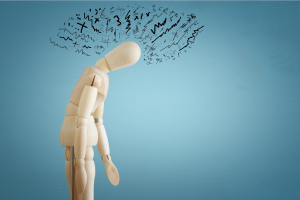6 Ways To Calm Your Nervous System
Do you always feel like you’re on high alert? Or do you just feel numb? Perhaps you bounce back and forth between the two? Have you wondered how to feel calm or peaceful? 
If you find the state of the world today especially triggering, you are not alone! Fortunately, by understanding our nervous systems and trauma responses, we can also understand and adopt new ways of calming our nervous systems to achieve enhanced wellbeing.
Trauma changes the nervous system. Complex, developmental and relational trauma (CPTSD) can alter the nervous system to remain in a constant state of being prepared for danger. Trauma survivors may exist feeling on-edge, hypervigilant or hyperaroused some or most of the time — or the complete opposite — numb, disconnected or shut down (hypoaroused). Some may feel a combination of the two. Chances are, because of the trauma that happened to you, changing your ability to feel steady and stable, your nervous system has a harder time regulating itself long after the traumatic events of the past. You might find yourself living in a constant state of activation or imbalance, struggling to ever feel regulated or calm!
The two main parts of the nervous system are involved in trauma responses:
The sympathetic nervous system (SNS) protects you by activating the fight, flight or freeze response. This is what gets activated immediately in a trauma response. For trauma survivors who now live in a state of hyperarousal, this part of the nervous system can stay activated and be in overdrive long term.
The parasympathetic nervous system helps you regulate and rest. This restores your body to a state of calm. It controls the body’s ability to relax and regulates things like rest, digestion, and energy conservation. However, for trauma survivors who live in a state of hypo-arousal, this part of the nervous system can steal the show.
These two systems usually work together, automatically, without a person’s conscious effort, as part of the autonomic nervous system. When they are in balance, our bodies work and feel pretty great! However, when the sympathetic nervous system is activated, it’s harder for the parasympathetic system to do its job.
When the sympathetic nervous system is constantly activated, this chronic stress can affect your immune system and your health. The same goes for an imbalanced activation of the parasympathetic nervous system.
After trauma, the nervous system can remain prepared for danger!
Nervous system reactions are exaggerated and extended for complex trauma survivors because they needed those responses so often, when experiencing trauma.
If a person experienced prolonged trauma or childhood trauma, those activated nervous system responses became part of their everyday lives. To protect them, their bodies started to live in hyperarousal (to notice danger early), or hypo-arousal (to ignore or numb out from what was happening). These nervous system responses stay— even when the person becomes an adult who is currently safe, and these responses are no longer necessary.
Those who haven’t endured trauma or were lucky enough to have had secure attachment growing up, can come back to center a little faster and more easily than trauma survivors. (This is why EMDR works faster for single incident trauma survivors.)
So, what do you do? How do you calm your nervous system (and help your body realize you are safe in the present moment)?
Though some trauma survivors suffer from hypoarousal and need help to work on activating in their current, safer adult lives, most live in a state of hyperarousal — where their fight, flight, freeze response is activated regularly. So today, we’re going to talk about some ways you can calm your nervous system. Remember, when your sympathetic nervous system is activated, your body thinks a dinosaur is chasing you – almost all of the time, and your mind cannot realize that you are safe.
These calming techniques are all intended to help your mind and body notice you are safe in the present moment.
Here are some things you can do, a little bit every day, starting in this moment right now, to begin to heal your nervous system. While these may have a positive impact in the moment, they also have a long-term impact on your nervous system when done as a daily practice.
- Breathe like Elmo. Trauma survivors who live in a state of hyperarousal are shallow breathers because they are staying activated and ready to fight, flight or freeze. Deep breathing calms the nervous system. Learn from Elmo. (Anyone who has taken a training with me already knows I just love this video – it incorporates teaching you how to breathe and for many of us, it brings the added bonus of laughter, which also helps calm the nervous system.)
- Notice and name 5 things in the room using all your senses. What can you see, hear, touch, smell, and taste? Green plant. Buzzing of the lamp. Carpet under my feet. Coffee brewing. The mint gum in my mouth. This helps your thinking brain — your prefrontal cortex — get back online.
- Name it to tame it. Can you notice what you are feeling? If you are feeling agitated or anxious, try to name the feeling you are having, which will allow your brain to send soothing neurotransmitters to calm you down. Learn more about Dan Siegel’s approach here.
- Notice: Am I in danger right here right now? If your nervous system is activated, it’s helpful to notice whether it’s because of the current moment, or something from the past. If you are triggered from the past, you could be in a flashback and need help noticing that you are not in danger currently – which is why we wrote this flashback halting protocol. If you are safe in the present moment, notice it. What tells you that you are safe now? I know I am safe since I am holding my car keys – I am old enough to drive! If you are safe, you can repeat this mantra: I’m safe, right here, right now.
- Move or play. Dancing, stretching, walking, yoga, and healthy exercise ground you into your current-day body.
- Focus on touch. Put on your fuzzy slippers and feel them under your feet. Pull a soft or weighted blanket over you. Put your hand on your heart. Touch your wedding ring. Focusing on how something feels to the touch can be grounding and soothing.
Remember — your activated nervous system does make sense given your trauma history. It may have kept you alive! The hope is — when reading this, you are now safe and no longer need to be on high alert ALL the time!
I encourage you to try these techniques and see what works for you. These efforts go hand-in-hand with nurturing and thanking your activated nervous system for keeping you safe all of those years! Now, it’s time to notice you deserve self-compassion, self-care, and reparative relationships, to help regulate your nervous system and give you the gift of calm and peaceful times.
Tags: anxiety, Complex PTSD, nervous system, trauma2 Comments
Comments are closed.










my husband of 66 years died a few weeks ago. I suddenly am having to live alone. I feel overwhelmed with grief and loneliness. I am 90 and have not lived alone or been without him since I was 22. I dread the days ahead unless I am meeting someone. Then I am filled with misery when they go and I am alone again.
Oh my dear, I’m sorry for your loss and I feel your pain in ways I can’t explain. I lost my sister 5 years ago, sometimes you have to open yourself to that pain and loneliness, let it run through you, it’s not something you can escape, but you can transform it and find ways to heal until you meet your love again.